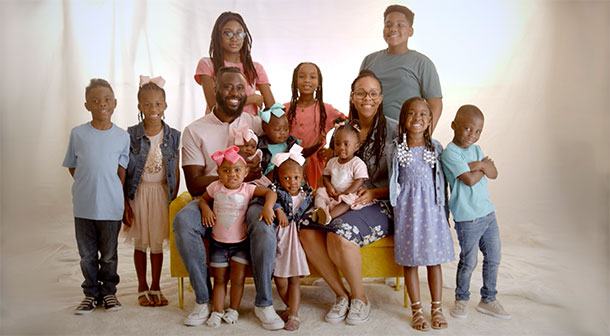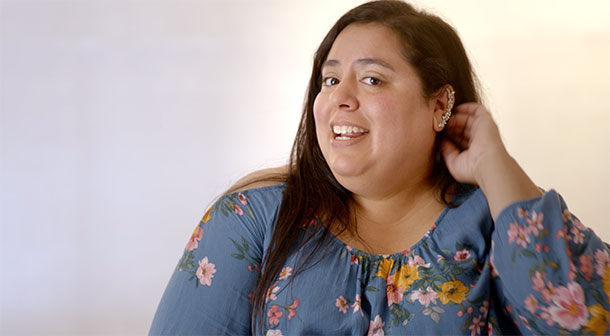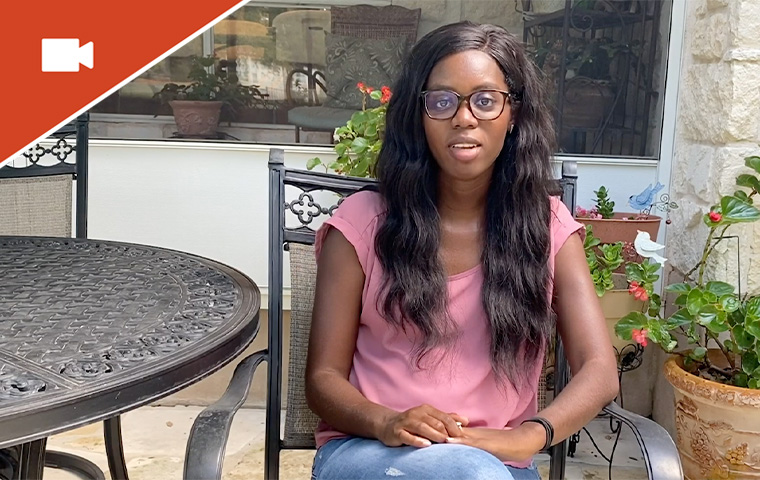All parents face challenges when it comes to raising kids. It doesn’t matter how many kids you have—if you’re raising them as a single parent or if you don’t have a strong support group, there will be times when you just don’t know what to do.
We talked to three families and learned how they manage discipline, stress, and breaking old habits to find better ways to parent. This is what they had to say:
Learning to Be a Better Parent
Becoming a Family
RENE: Cory and I met at church. And I just casually asked, like, “How many kids do you have?” And when he told me, I was like, “Me too!” (laughs). When we first got together, we had 13 (kids) total.
VENESSA: I got married at a pretty young age. I got married when I was 19. I got pregnant two years later with the twins. When I found out that I was pregnant with Travis, I was so overwhelmed. But as a new mom, I knew that it was going to be so important for me that my kids felt really felt loved and felt safe.

Rene and Cory with 12 of their kids.
Creating a Loving Environment
CORY: I believe a safe and loving environment is full of love, hugs, and kisses, but I also believe it’s a place where exchanges happen that are healthy, and it's a lot of I'm sorrys from us as adults. Because, you know, we as parents make mistakes.
Grow your relationship with your kids: 5 Steps to a Healthier Parent-Child Relationship
What to Do When You’re Feeling Frustrated
PAIGE: I am 22 years old. I'm a single mom of two girls. Their dad is super involved. We just recently split up.
With our first daughter, she was about six months old, I found myself getting really frustrated with her, actually. And so, I would reach out to the mom groups on Facebook. And they taught me how to be a gentle parent when your kids have big feelings, like being angry or being sad. It's showing up with patience and kindness. They taught me you don't have to spank your kid in order for them to understand you.

Paige seeks support from other parents when she feels frustrated.
Positive discipline is one aspect of positive parenting. Learn four strategies to get you started:
The Power of Positive Discipline: 4 Strategies to Get You Started
Learning About Child Development
VENESSA: As a new mom, I didn't really know too much about the developmental stages of young children and babies. The WIC program really helped me with checking in and making sure they were developing the way they should.
RENE: I am a normal mom. And I worry a lot about stuff. “Wait, how many words are in her vocabulary?” “She's past the 12-month mark. She's not walking yet!” But I talked to the pediatrician, and she always helps to calm me down (laughs). She’ll be like, “No. She's fine.” I'm like, “Are you sure?” “I'm sure.” “OK, thanks.”
PAIGE: I learned a lot about teaching my kids communication through Any Baby Can. That was a really big resource for me.

Venessa shares what it is like to be a single mom.
Parenting is hard. Getting help is easy. Use the Local Support Directory to find programs in your county that can help you and your family.
Teaching Kids to Communicate
PAIGE: I verbalize a lot when they're upset, when they're angry, when they're sad, when they're happy. That way when they are upset in moments, they're able to communicate that back to me. That to me is really important because I struggled with that even through my teens.
CORY: As parents, I think we tend to think that we set the tone for the safe space. It's like no, it's a collaborative thing. The children also should have part in creating the safe space. I believe it's important to talk to your kids because you want them to feel comfortable at home. And if they're feeling comfortable at home and advocating for themselves at home, you feel reassured that they're doing that outside of the home.
VENESSA: I try to find moments here and there where I can communicate with my kids. If we're walking, or making dinner, it's an opportunity to just let things come out. And for me to really listen. We talk a lot. We communicate a lot. There's always something to discuss.
How can you help your child become stronger when it comes to dealing with emotions, making friends, and handling new situations? Learn seven ways to encourage your child’s development.




